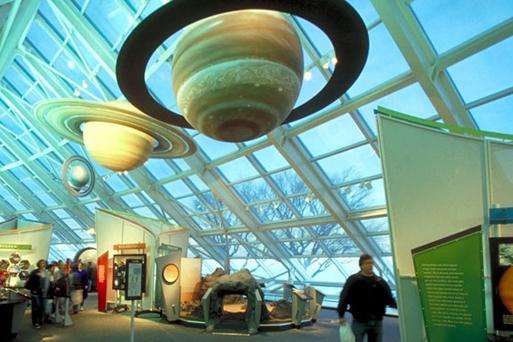Lesson 5 eReport
第五課 英文札記
October 10
10月10日
The Tainan Astronomy Museum
臺(tái)南天文博物館

At Tainan's Astronomy Museum, people can learn about space.
在臺(tái)南的天文博物館,人們可以認(rèn)識(shí)太空,
They can learn all about the solar system, too.
他們也可以學(xué)到很多太陽(yáng)系的知識(shí)。
The solar system has at least eight planets.
太陽(yáng)系有至少八個(gè)行星,
We live on a small planet called Earth.
而我們住在一個(gè)名為地球的小行星上。
Every planet in the solar system is different.
太陽(yáng)系里的每個(gè)行星都不同,
Some planets are very hot and dry.
有些行星非常酷熱和干燥,
Other planets are very cold.
其他的行星則非常冰冷。
All these planets move around a star.
這些行星都繞著一個(gè)恒星在轉(zhuǎn),
That star is the sun.
這個(gè)恒星就是太陽(yáng)。
The sun is very important.
太陽(yáng)非常重要,
It gives the earth days and nights and helps life grow.
它讓地球有日夜之分,而且?guī)椭砷L(zhǎng)。
The Astronomy Museum has big telescopes.
天文博物館有個(gè)很大的望遠(yuǎn)鏡。
Using them, people can see stars and other planets.
透過(guò)它,人們可以看到星星和其他行星。
They can look at pictures of star groups and try to find them in the sky.
他們可以看著星座的照片,然后試著在天空中找到它們。
People look for a star called the North Star.
人們會(huì)尋找一顆星,叫做北極星,
This star helps people travel in the right direction.
它幫助人們依循正確的方向旅行。
People see other things in the sky, too.
人們?cè)谔炜罩羞€可以看到其他的星象,
Sometimes a star seems to shoot across the sky.
有時(shí)會(huì)有一顆星星快速劃過(guò)天際,
These are called shooting stars.
那就叫做流星。
In 1961, the first man went into space.
在一九六一年,第一位人類(lèi)進(jìn)入太空。
That was very exciting and changed the world.
那件事非常令人振奮,而就此改變了世界。
More people and rockets went into space after that.
自此之后有更多的人和火箭進(jìn)入太空。
In 1969, the first man walked on the moon.
到一九六九年,第一位人類(lèi)走在月球上。
Today many countries are working in space.
現(xiàn)今有很多國(guó)家在太空中工作,
They work in a space station.
他們?cè)谝粋€(gè)太空站里面工作,
They travel to and from the space station in a space shuttle.
他們乘坐航天飛機(jī)往返于這個(gè)太空站。
Now we know a lot about space, but there is still much more to learn.
現(xiàn)在我們知道很多有關(guān)太空的事物,但是仍舊有許多事情等著我們?nèi)W(xué)習(xí)。











